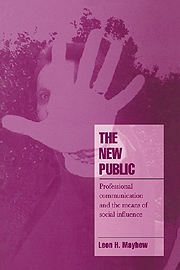Book contents
- Frontmatter
- Contents
- Preface
- Part I Rhetoric and the integration of society
- Part II Influence
- Part III The New Public
- 7 The emergence of the New Public: advertising, market research and public relations
- 8 Political communication in the New Public
- 9 Forums for the redemption of influence
- 10 The rhetoric of presentation
- Notes
- References
- Index
7 - The emergence of the New Public: advertising, market research and public relations
Published online by Cambridge University Press: 06 September 2009
- Frontmatter
- Contents
- Preface
- Part I Rhetoric and the integration of society
- Part II Influence
- Part III The New Public
- 7 The emergence of the New Public: advertising, market research and public relations
- 8 Political communication in the New Public
- 9 Forums for the redemption of influence
- 10 The rhetoric of presentation
- Notes
- References
- Index
Summary
The rise of the New Public could be recounted as a tale of Enlightenment betrayed and rationality perverted by good intentions gone awry. There is some merit in this ironic interpretation. Public opinion polling can be traced to late nineteenth-century British surveys of poverty by researchers motivated by hopes for reform (Abrams 1951). Market research was promoted by people who sincerely believed that increasing consumption was an essential means for ensuring prosperity in a late capitalist economy. Some of the earliest lobbying in pre-revolutionary America was conducted on behalf of the religious liberties of American left-wing Protestants through friendly, mutually beneficial exchanges between parliamentarians and British dissenters representing their American brethren who, in a colonial situation, were without representation of their own. Later, in the nineteenth century, mass lobbying began in the United States in the name of legislating general rights for groups of people – initially veterans – who had until then been required to pursue redress individually, seeking the personal patronage of legislators powerful enough to secure private bills for them. The electoral reforms of the progressive movement, including the direct primary, were directed against the party bosses. Reforms were designed to promote democratic aims, but they helped undermine political parties and thus contributed to creating the vacuum that was ultimately filled by political consultants.
The rationalization of persuasion
Whatever the immediate aims of the creators of the New Public, the dominant principle governing their means was the rationalization of persuasion. The pioneers of the movement sought effective means of persuasion based on research on audiences and the organization of systematic campaigns.
- Type
- Chapter
- Information
- The New PublicProfessional Communication and the Means of Social Influence, pp. 189 - 208Publisher: Cambridge University PressPrint publication year: 1997

